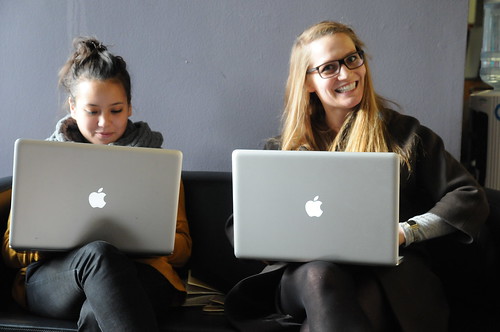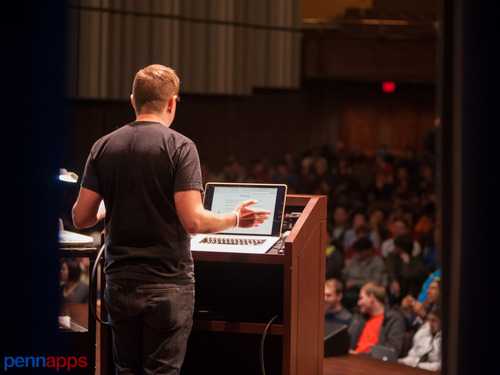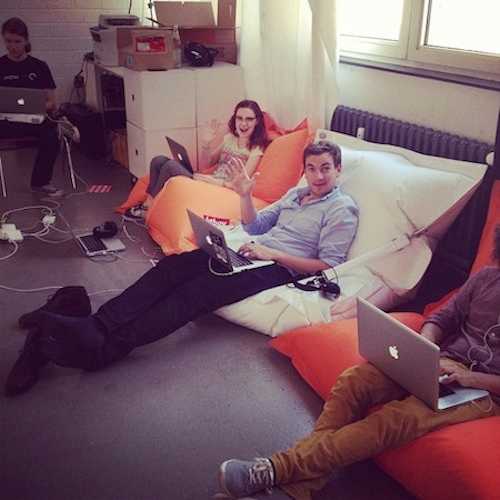Music Hack Day Coming to Toronto!
July 9th, 2013 by Paul OsmanThe first Music Hack Day — organized by our very own Dave Haynes — was held in July 2009 in London, UK. Since then there have been over 30 Music Hack Day events all over the world in cities like San Francisco, New York, Paris, Barcelona and Reykjavik.
Music Hack Day events gather programmers, designers and artists to conceptualize, build and demo the future of music. Software, hardware, mobile, web, instruments, art — anything goes as long as it’s music related.
I’m happy to announce that SoundCloud is teaming up with Rdio, Unspace and The Echo Nest to organize the first ever Music Hack Day in Toronto. MHD Toronto…
SoundCloud at PennApps
January 23rd, 2013 by Paul OsmanLast weekend, we sponsored and attended our first PennApps, the world’s largest student run hackathon held at the University of Pennsylvania in Philadelphia. Nearly 500 students participated from a variety of universities across the US and elsewhere. Students were given 36 hours to get into teams, hack on projects, then show them off to the judges. The results were astounding. In total, over 100 hacks were submitted. Here are some of my personal favourites.
How to Make a SoundCloud Powered Children's Toy
August 30th, 2012 by paulosmanJust over a week ago we had our first internal hackathon at SoundCloud. You can read (and listen!) about it on our community blog or read some of the awesome press coverage the event received.
We had over 60 people attend and over 20 projects were demoed. I joined a team organized by Josh Devins to build ToyBox, a children’s toy that plays sounds from SoundCloud in response to physical events. The team consisted of myself, Horaci Cuevas, Josh Devins, and Oliver Hookins.
The first task was to come up with a design for our project. An Arduino fitted with gyro, accelerometer and motion sensors provided the interface between real world events and the rest of the system. A Raspberry Pi…
Recording and Sharing Phone Calls
July 12th, 2012 by Paul OsmanA few weeks ago, I attended News Hack Day in San Francisco. News Hack Days are events that bring together journalists, developers and designers for multi day creative coding and brainstorming sessions.
I really like the idea of hack days that bring together people from different backgrounds. After chatting with a few journalists, it became obvious to me that recording interviews on the phone is a real pain. I saw this as an opportunity to build a fun app that would make this easier for people.
Music Hack Day Barcelona 2012
June 29th, 2012 by Darrell StephensonSoundCloud loves hack days. Our latest hack day adventure brought us to Music Hack Day in Barcelona and we thought we’d share a bit of the great experience we had there.
 Photo by Thomas Bonte
Photo by Thomas Bonte
Create rich media experiences using timed comments
April 11th, 2012 by Johannes WagenerIn the last weeks we got pretty excited about the idea of using timed comments to create and script rich media experiences. Imagine being able to trigger all kinds of visualizations & interactions for a timed comment while playing a track.

Hacker Time – the first 3 months
March 19th, 2012 by Alexander GrosseOver 3 months ago we started the “Hacker Time” initiative (see here) and now it is time for a recap what’s happened so far. From the outset, people outside of the engineering department were very forthcoming in suggesting ideas for Hacker Time projects. While it was great to see so much interest, the essence of Hacker Time is that engineers create the projects that they’re personally motivated to develop. (It’s absolutely key to keep things separate from the general backlog!). Once that clicked…
SoundCloud at Music Hack Day SF
February 14th, 2012 by paulosmanThis past weekend, hundreds of hackers showed up at the TokBox HQ with a mission to build the future of music. The event started with pitches — giving sponsors a chance to show off their APIs — followed by in-depth workshops where attendees could learn more about each platform and ask questions related to their project. Once the hacking time started, people quickly broke off into groups and got to work.
Music Hack Day London 2011
January 3rd, 2012 by Roel van der VenLast month we attended Music Hack Day London 2011. A special one, Music Hack Day was born in London 3 years ago and we were happy to attend a hack day again in it’s homeland.

For those who do not know of Music Hack Day, it’s a great weekend-long event aimed at music and sound hackers. Anyone can attend the event for free, and their goal is to conceptualize and develop innovative hacks of either software or hardware.
Stop! Hacker Time.
December 9th, 2011 by Alexander GrosseAt SoundCloud we like to invent new ideas. But we’re not adverse to implementing really great tried and tested ideas like the 20% time concept made famous by Google.
We’re calling it Hacker Time. We’re still very much in start-up mode so we’re keen to nurture the spirit of hacking. We’ve been testing out Hacker Time for a few weeks now and we’re excited about its potential, from industry-changing initiatives like “Are we playing yet” to unusual passion projects like the “Owl Octave”.



